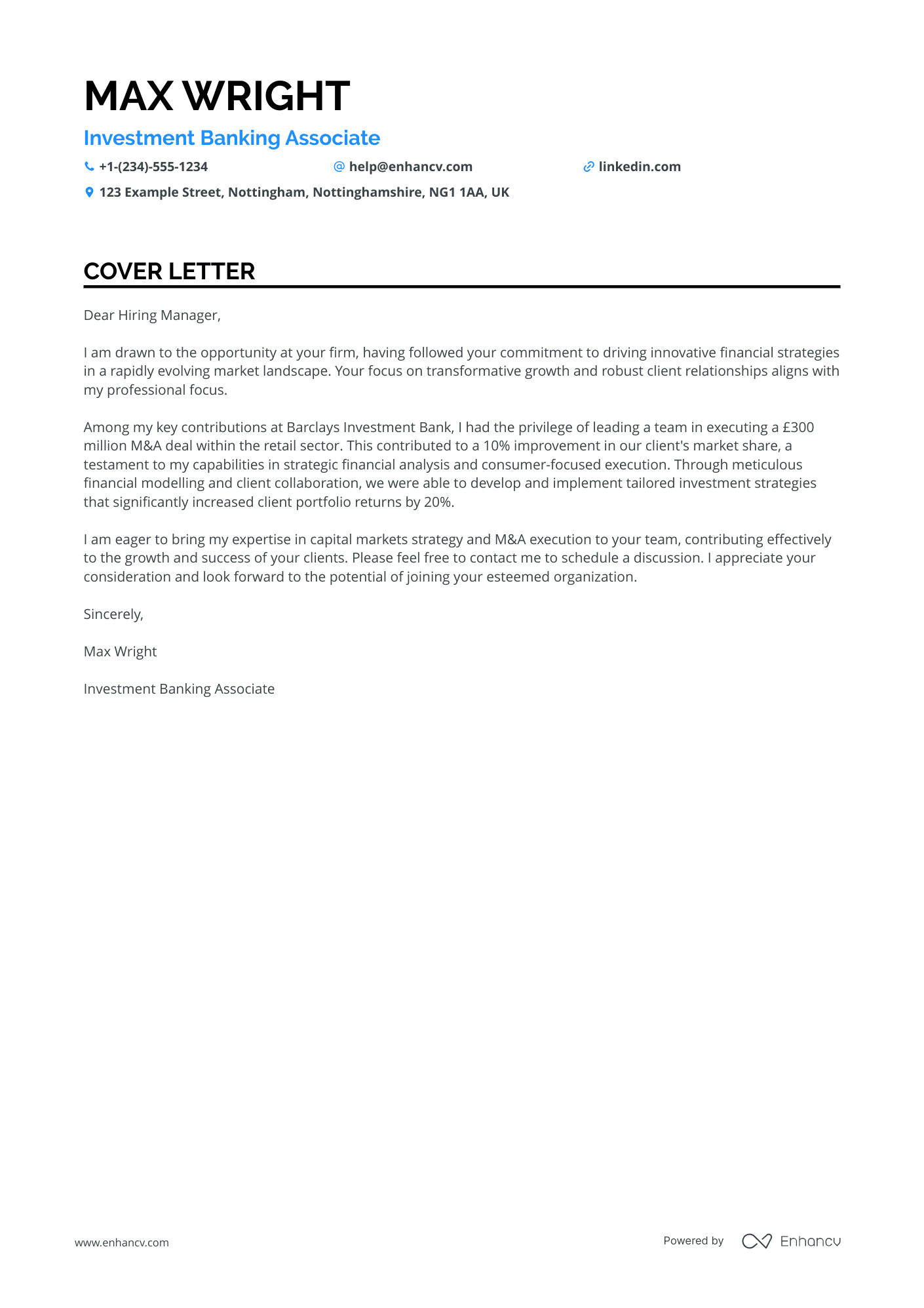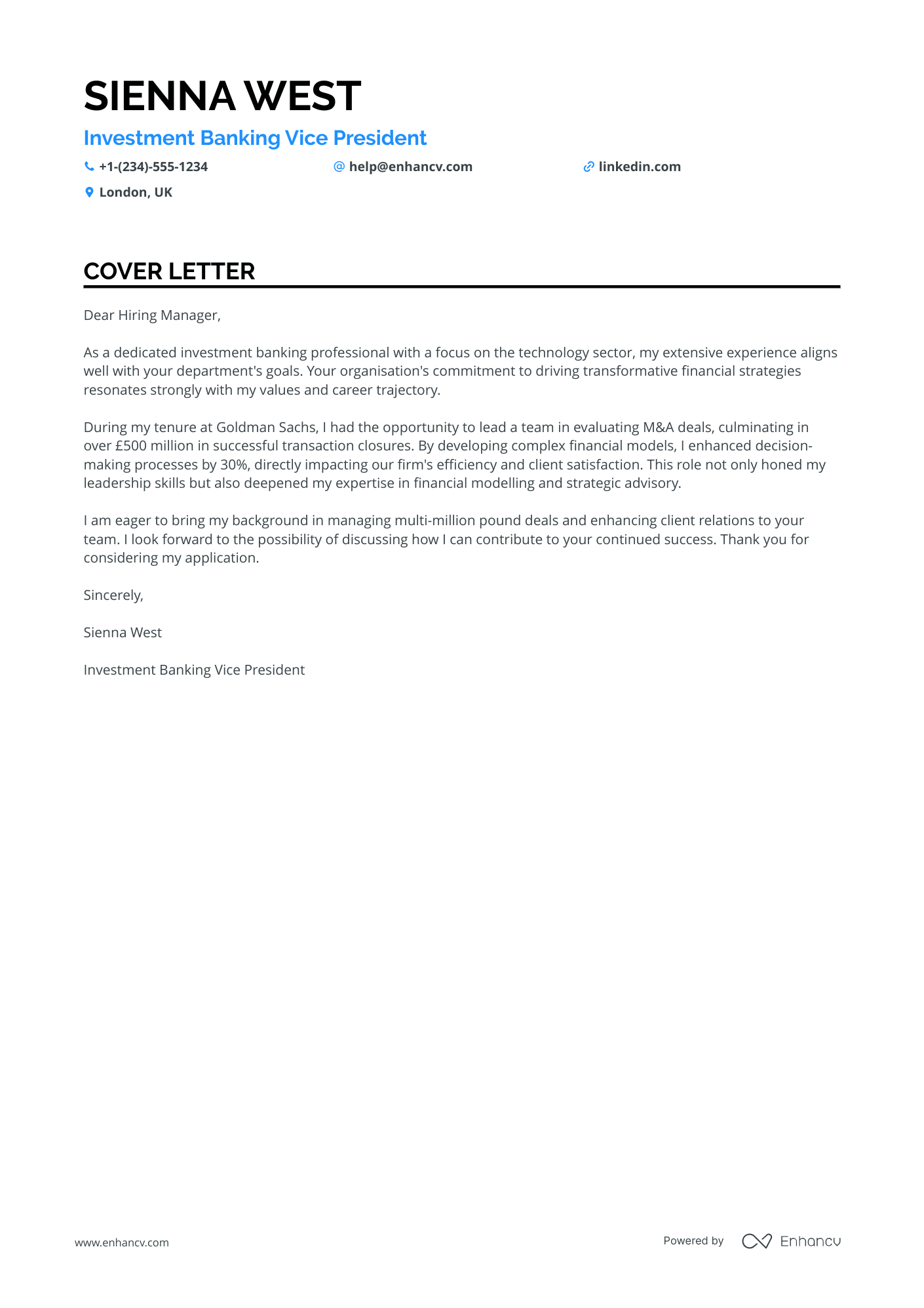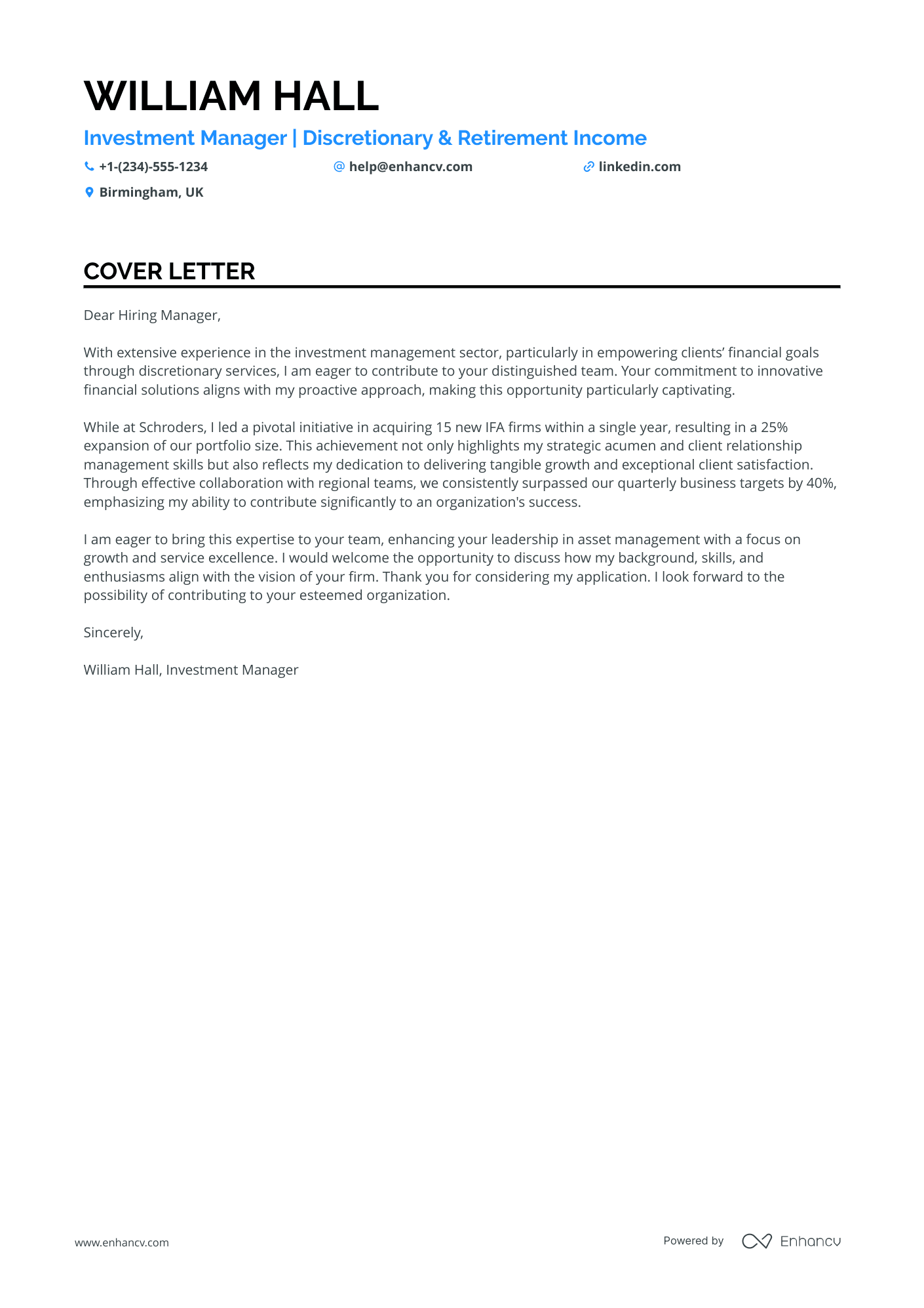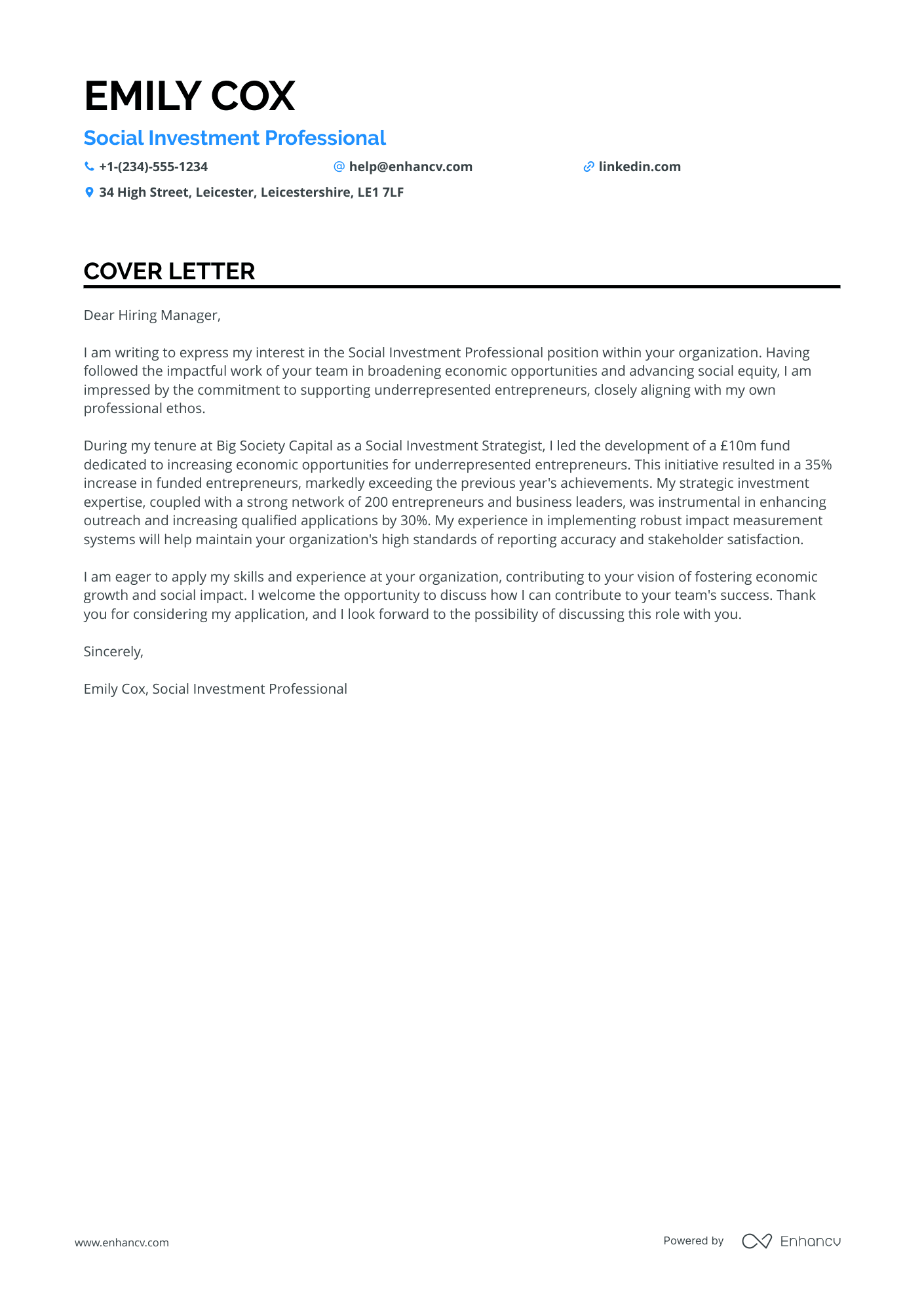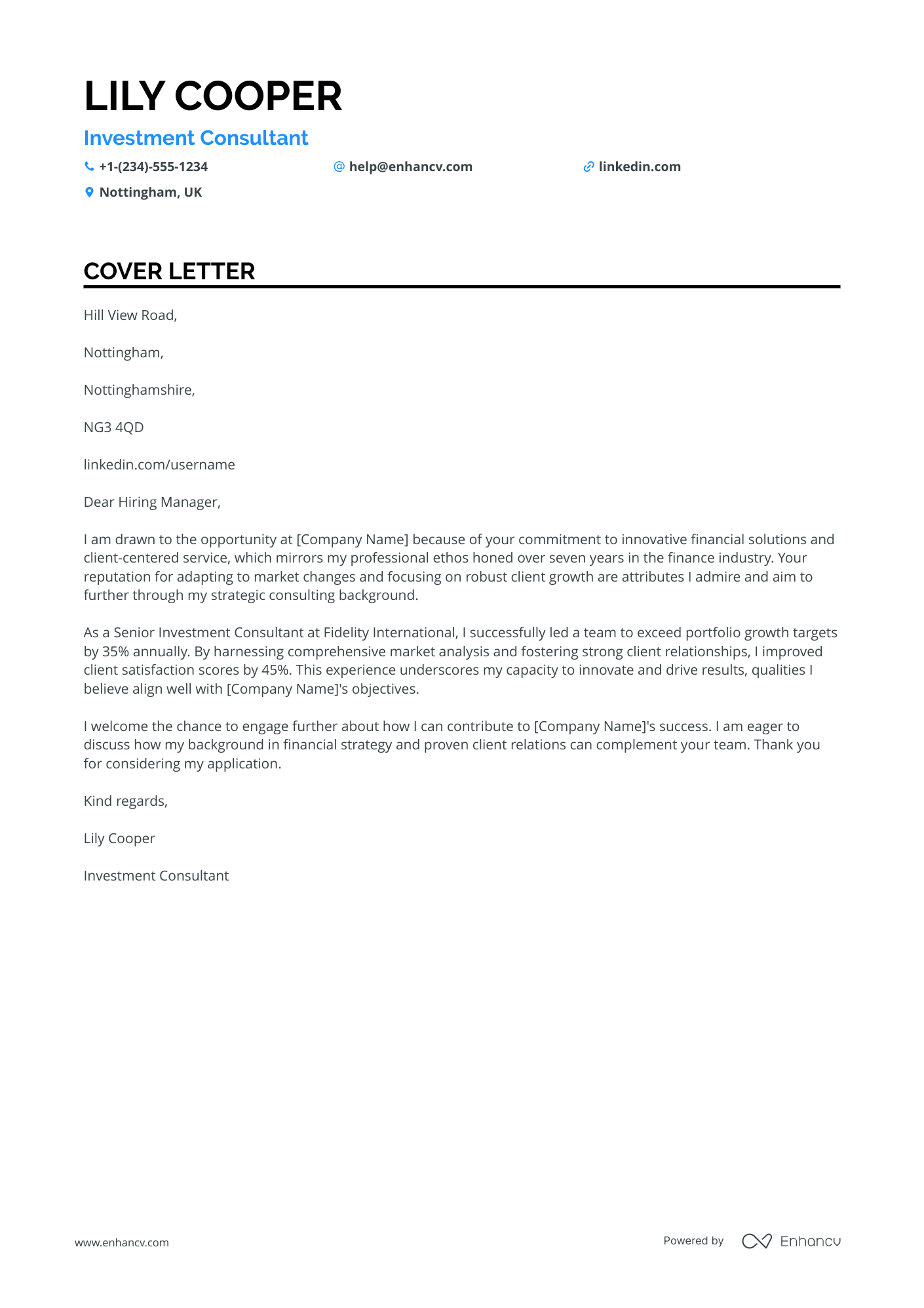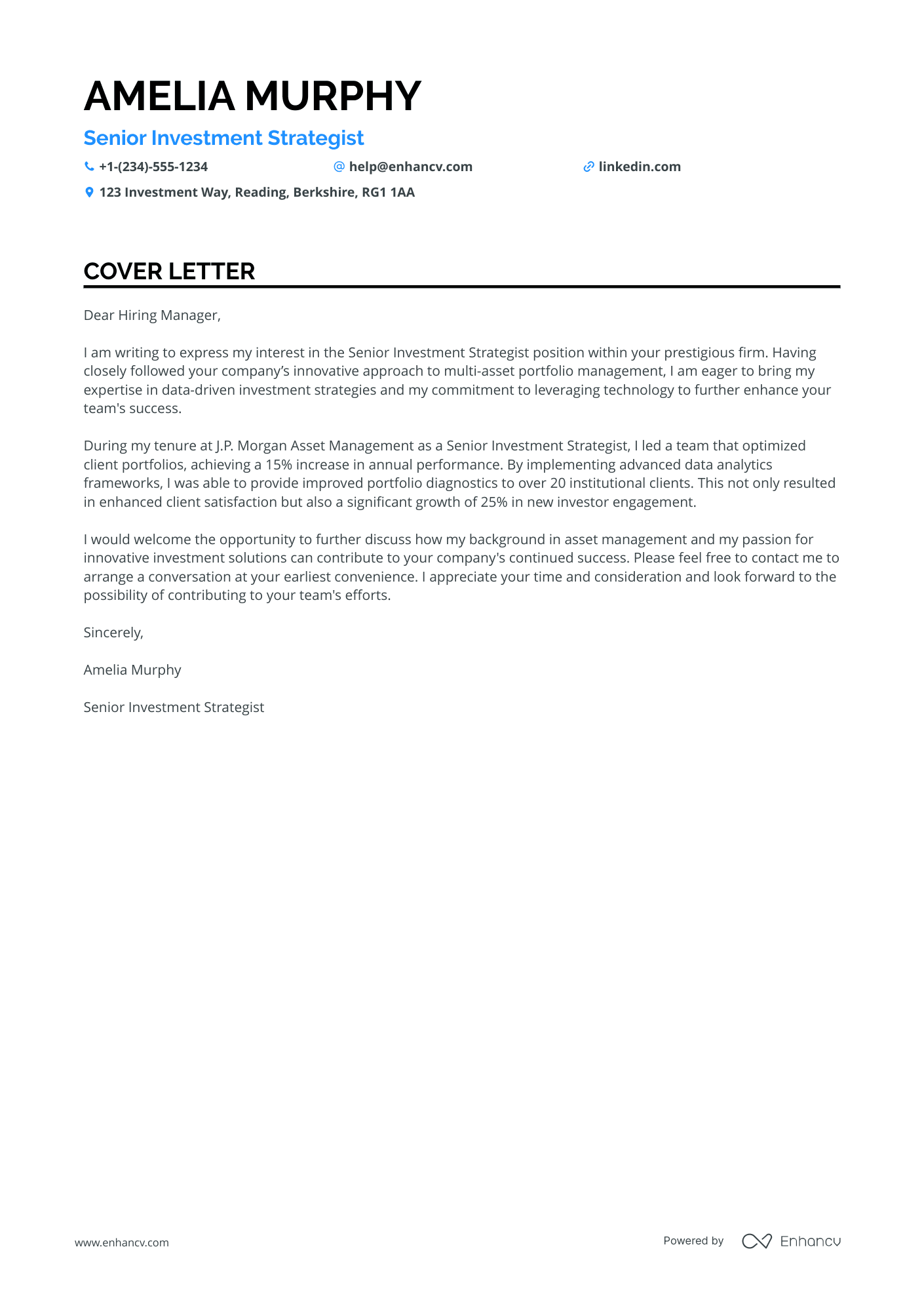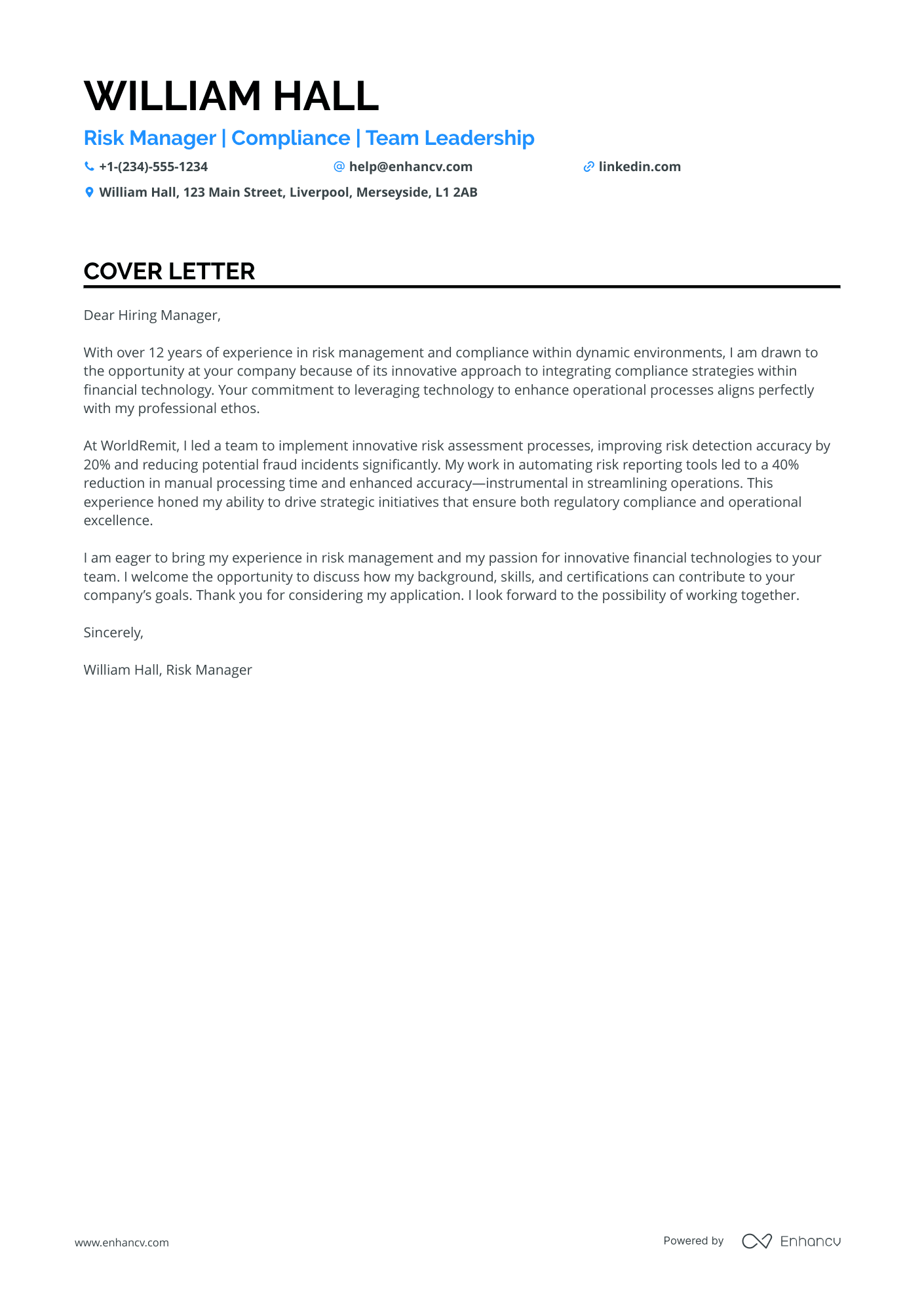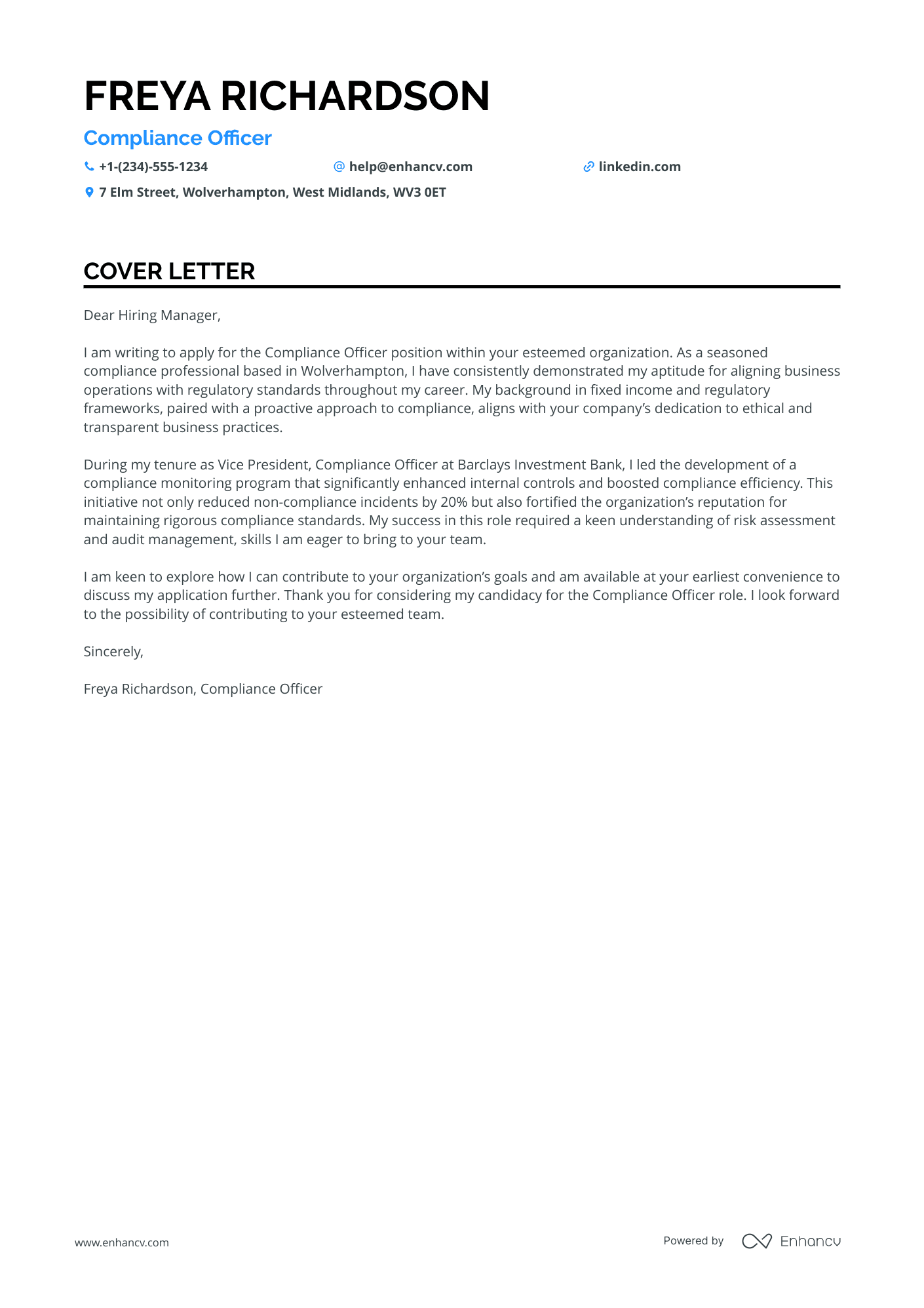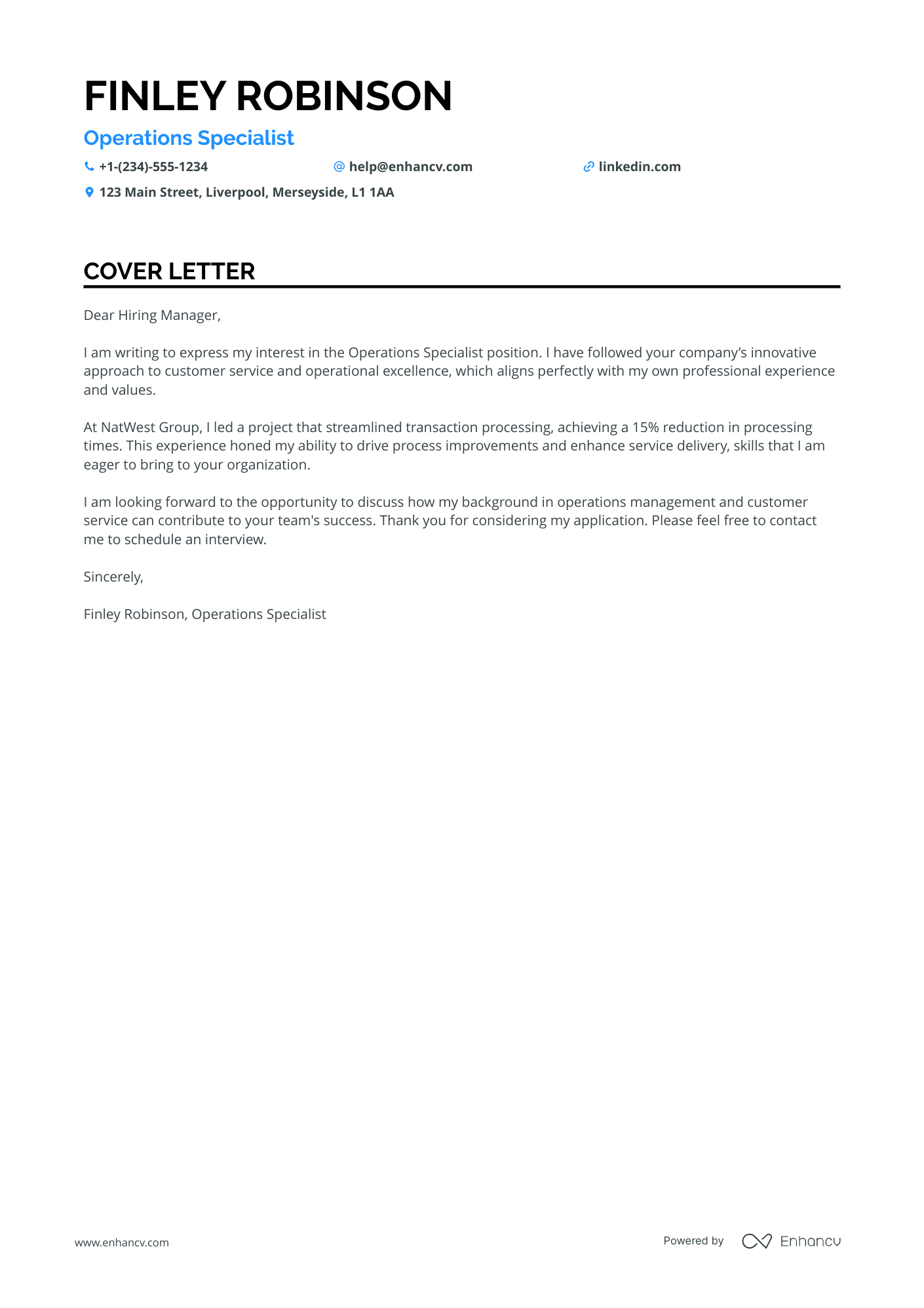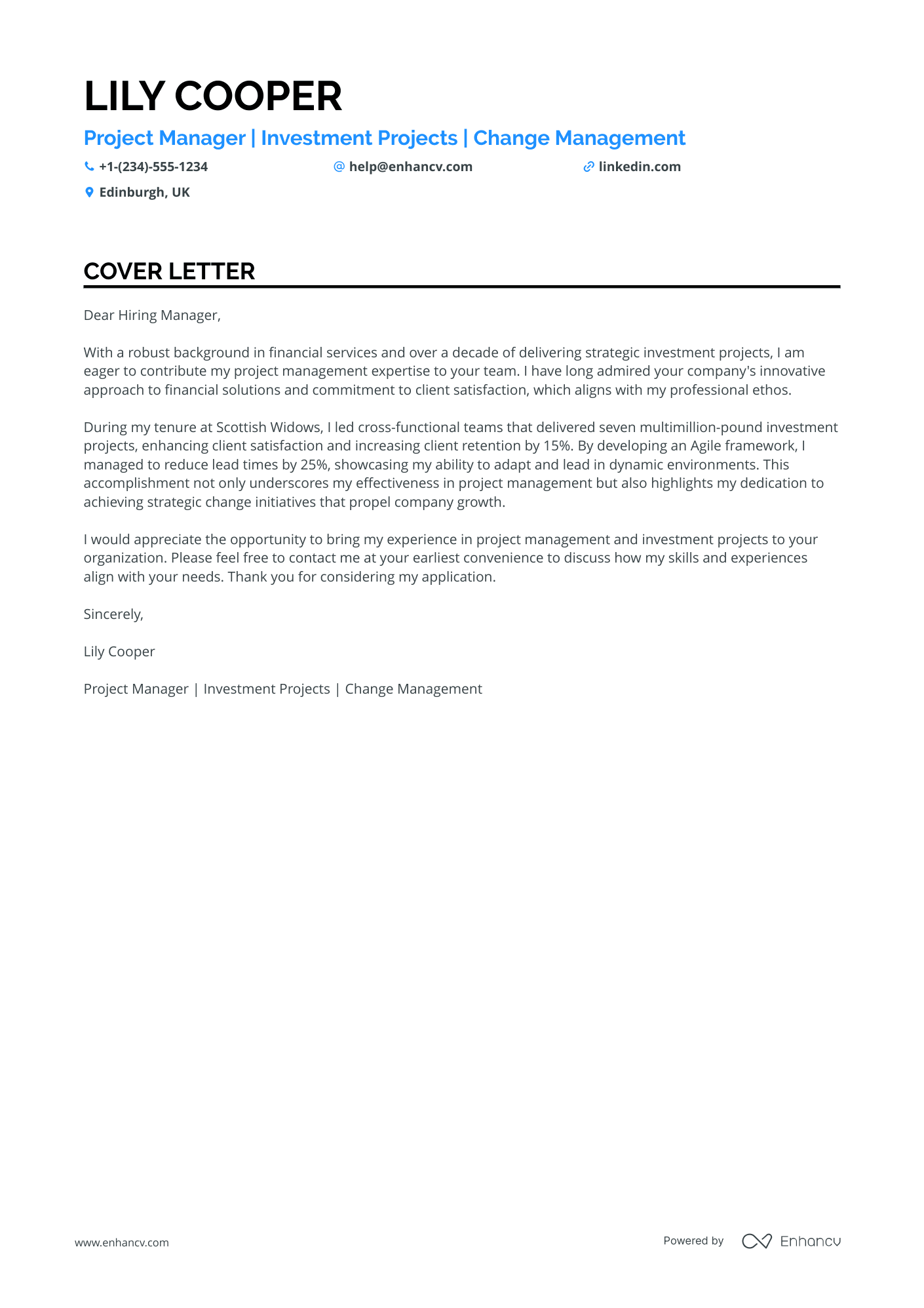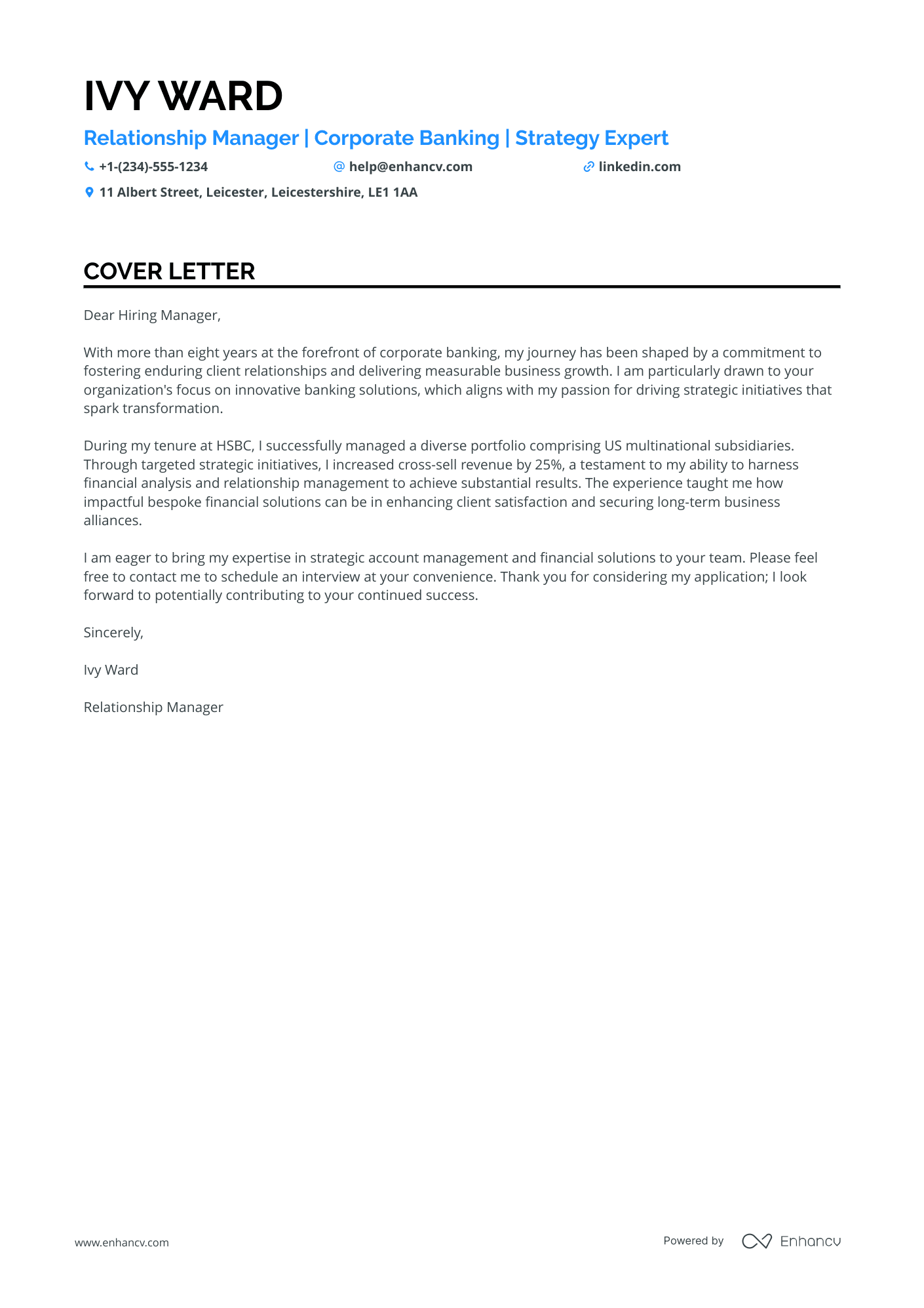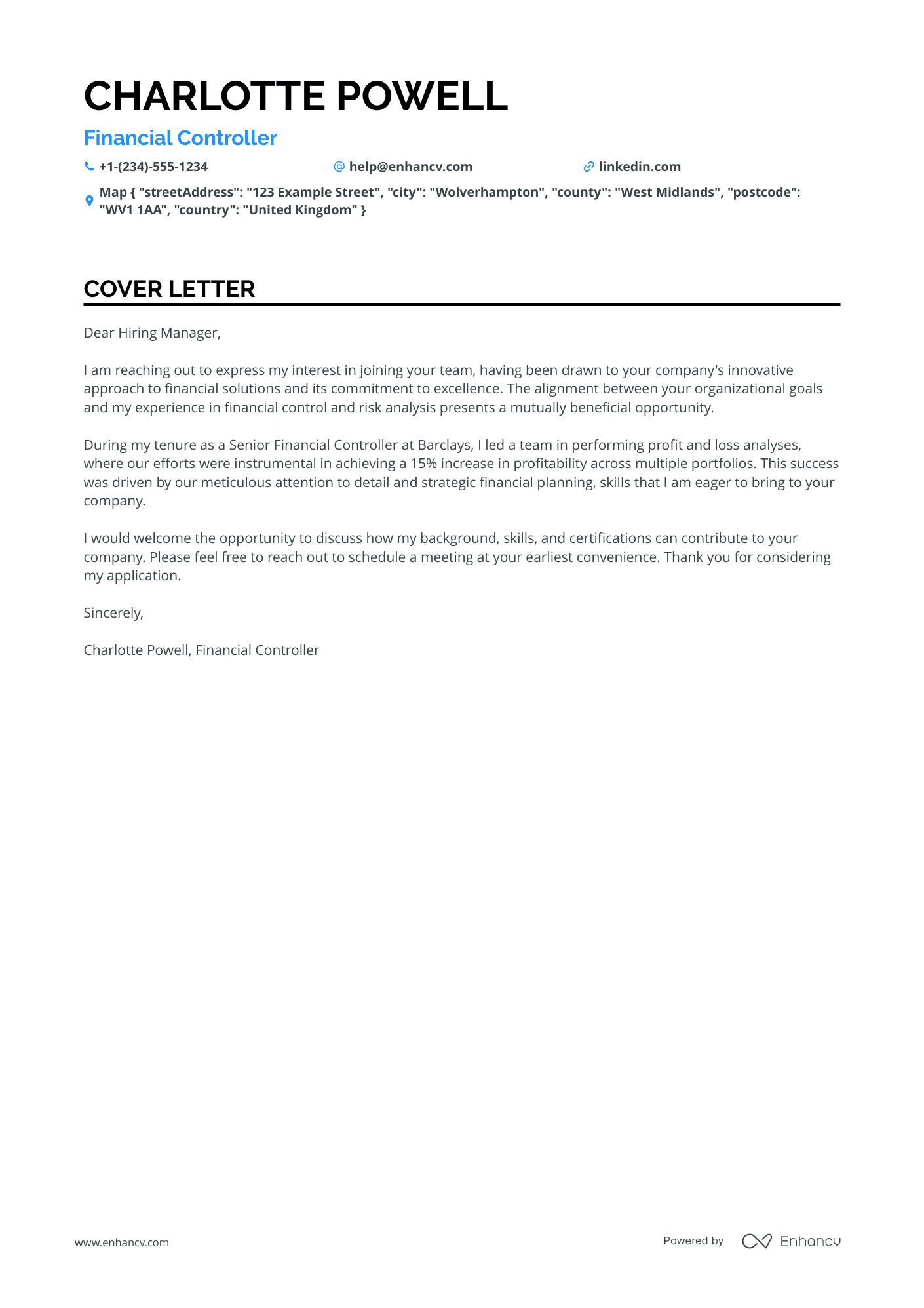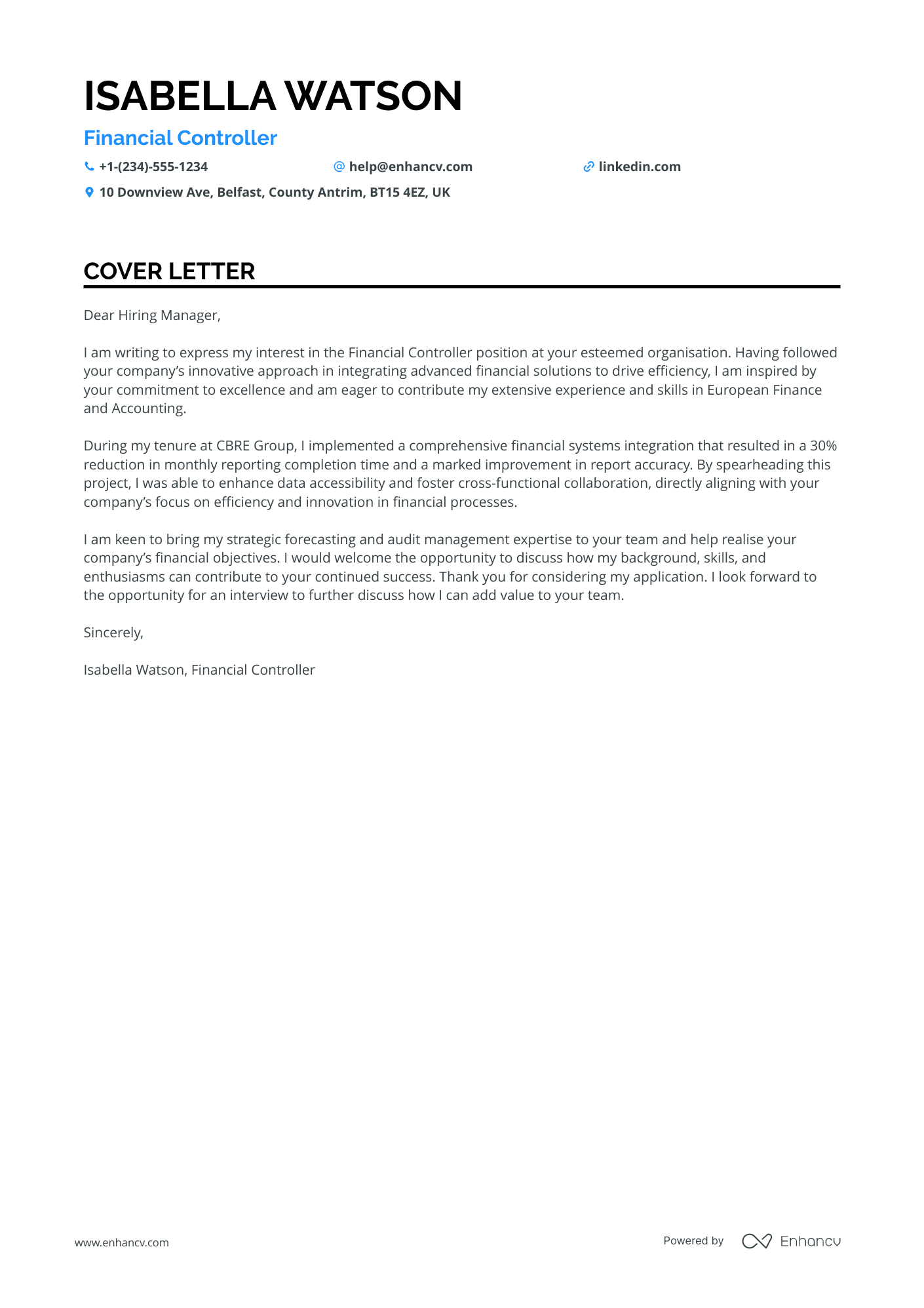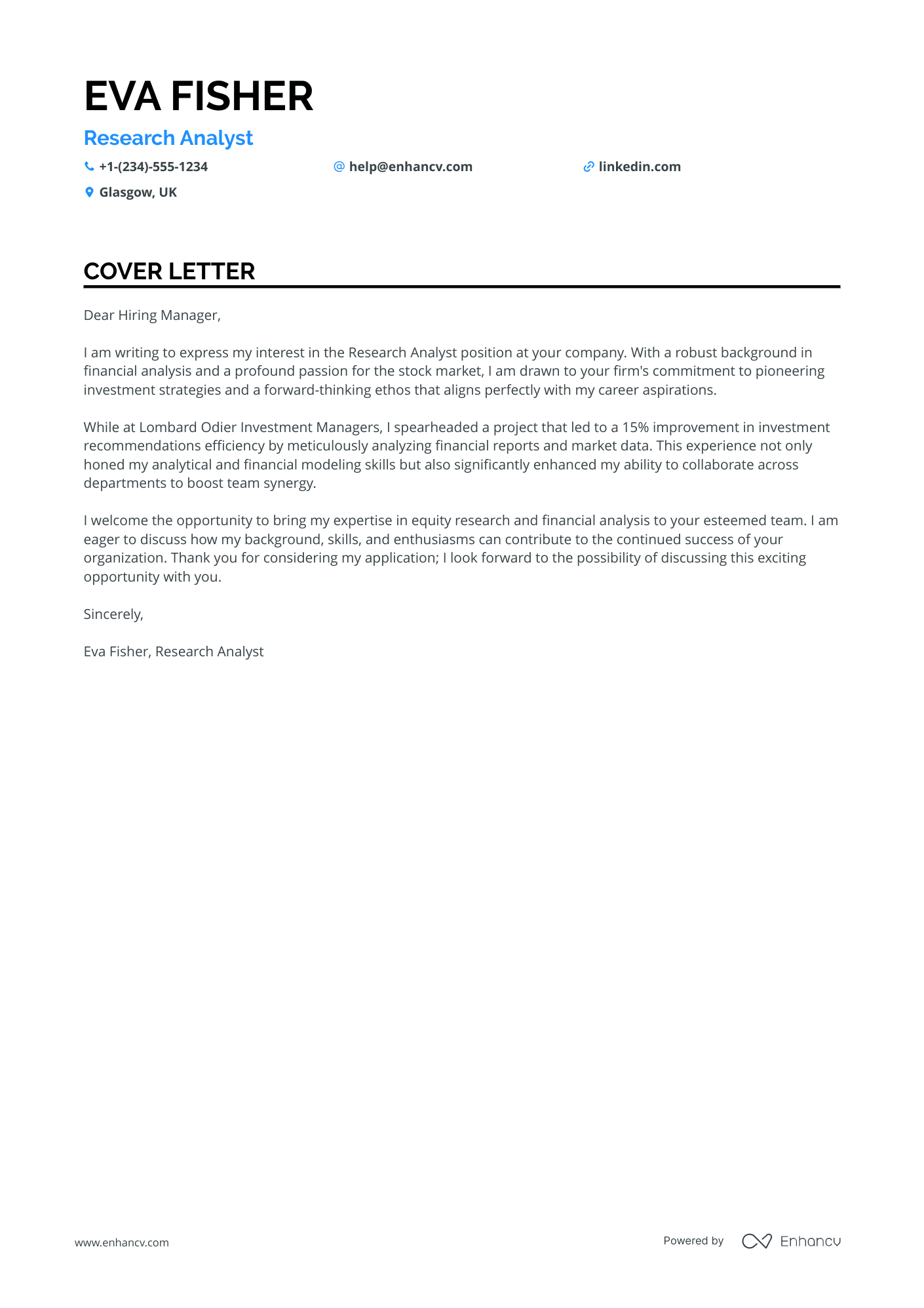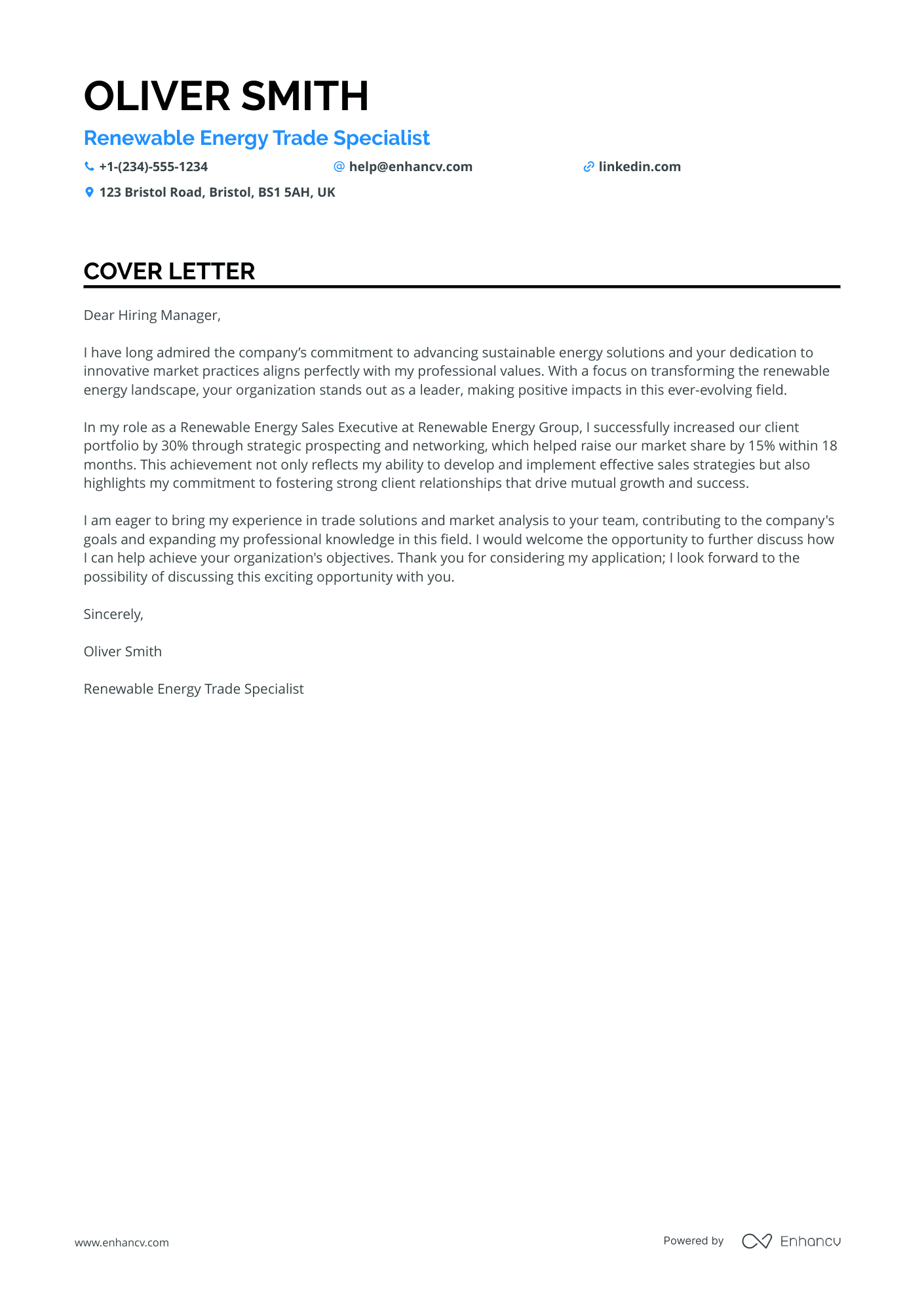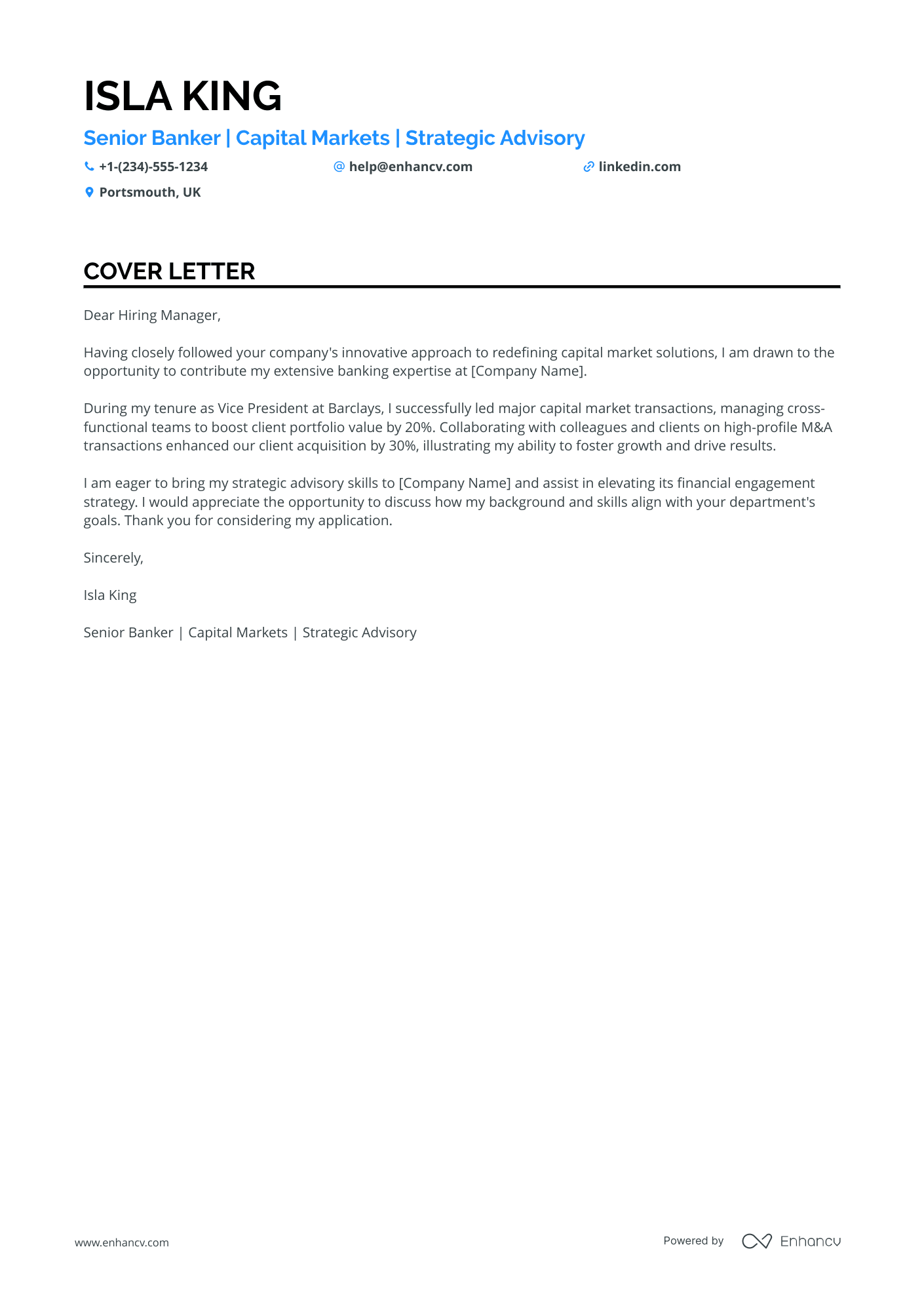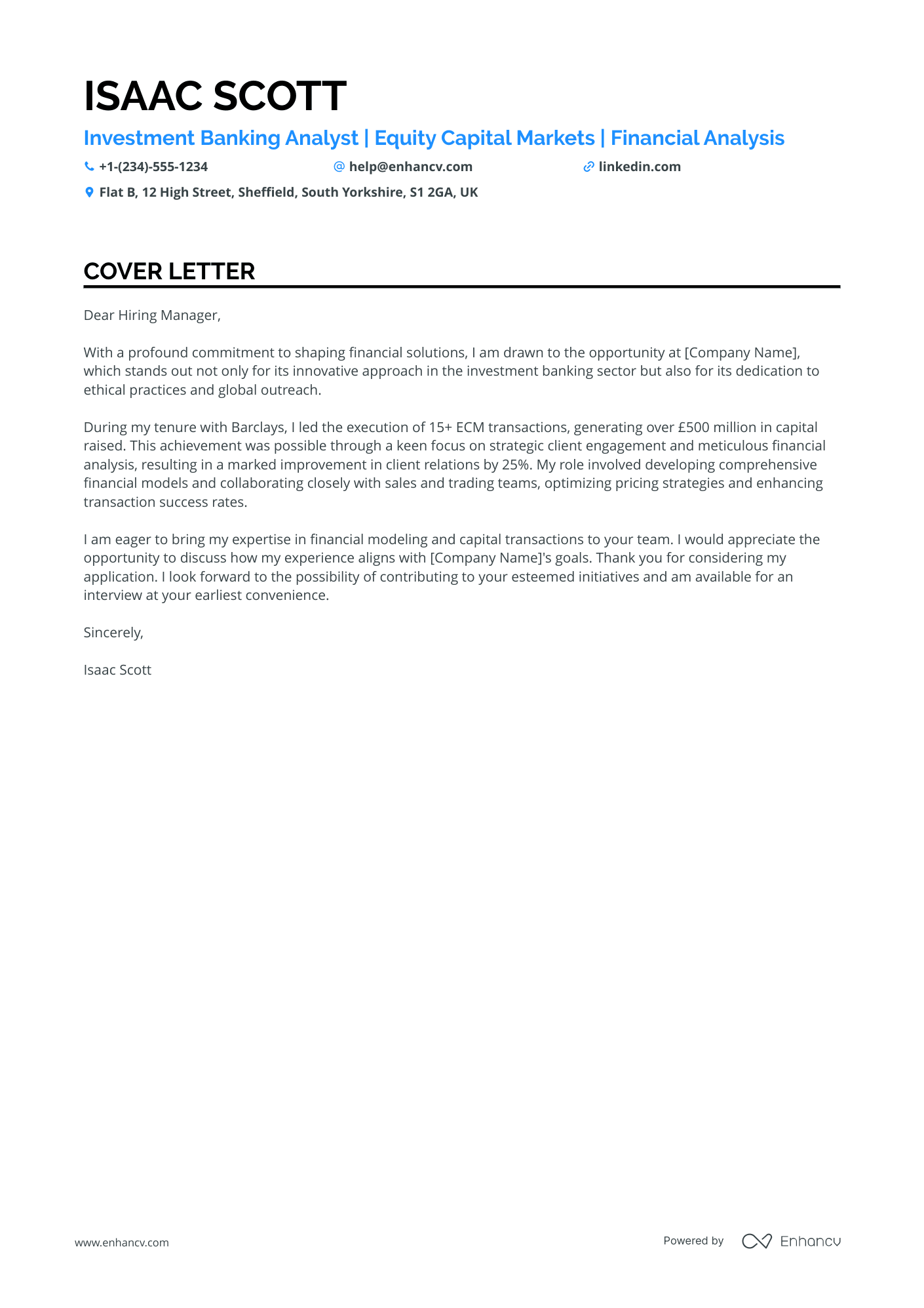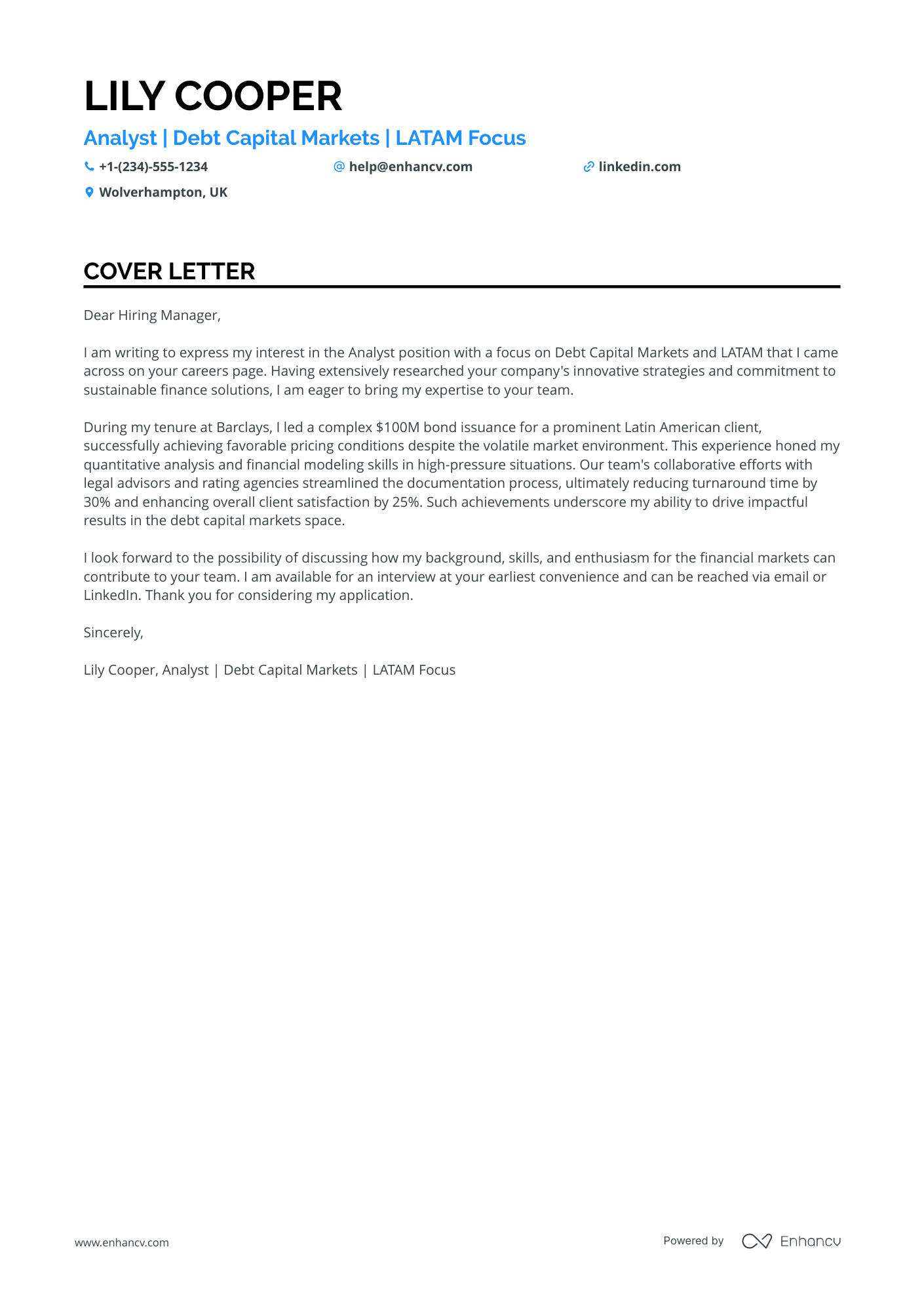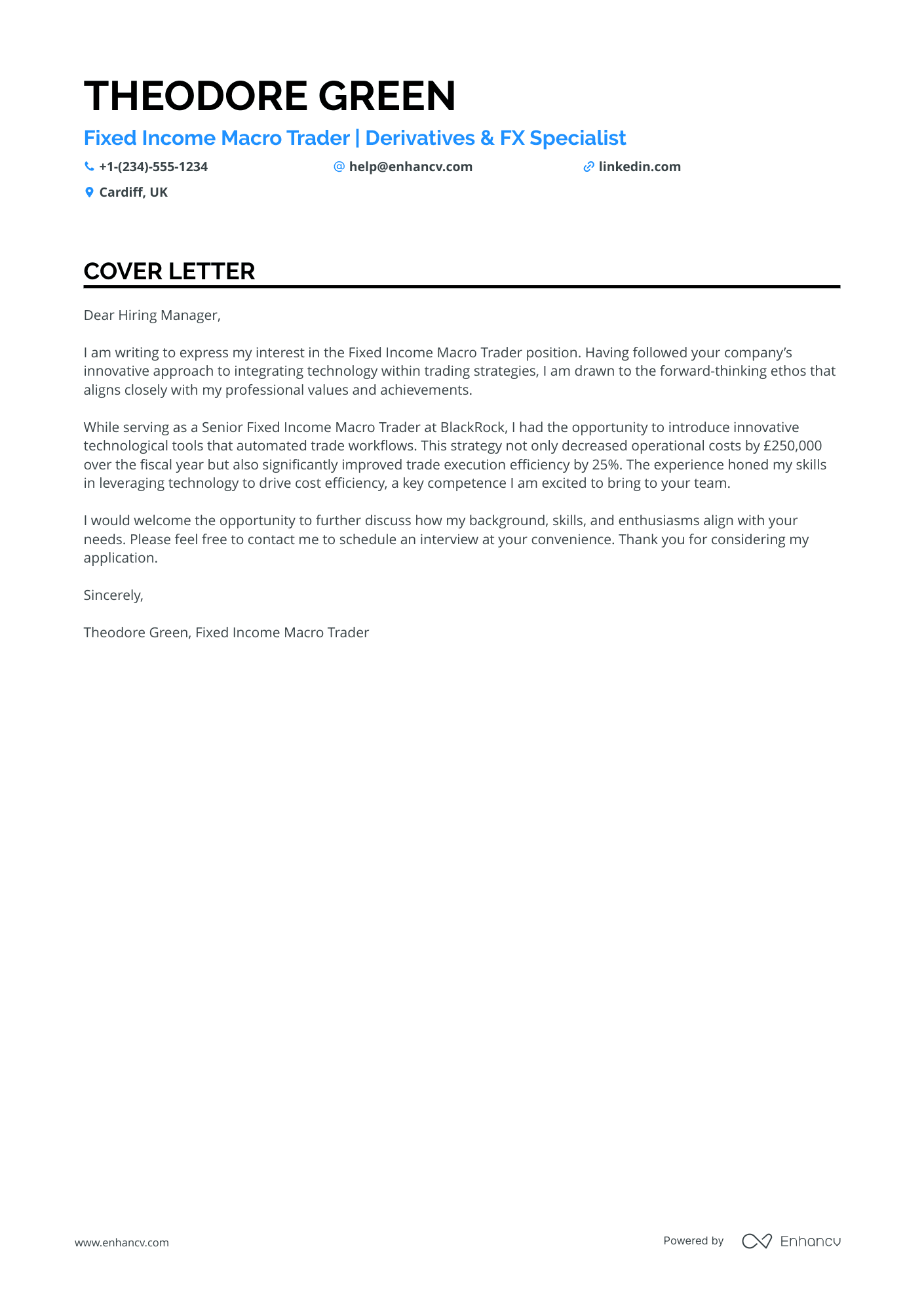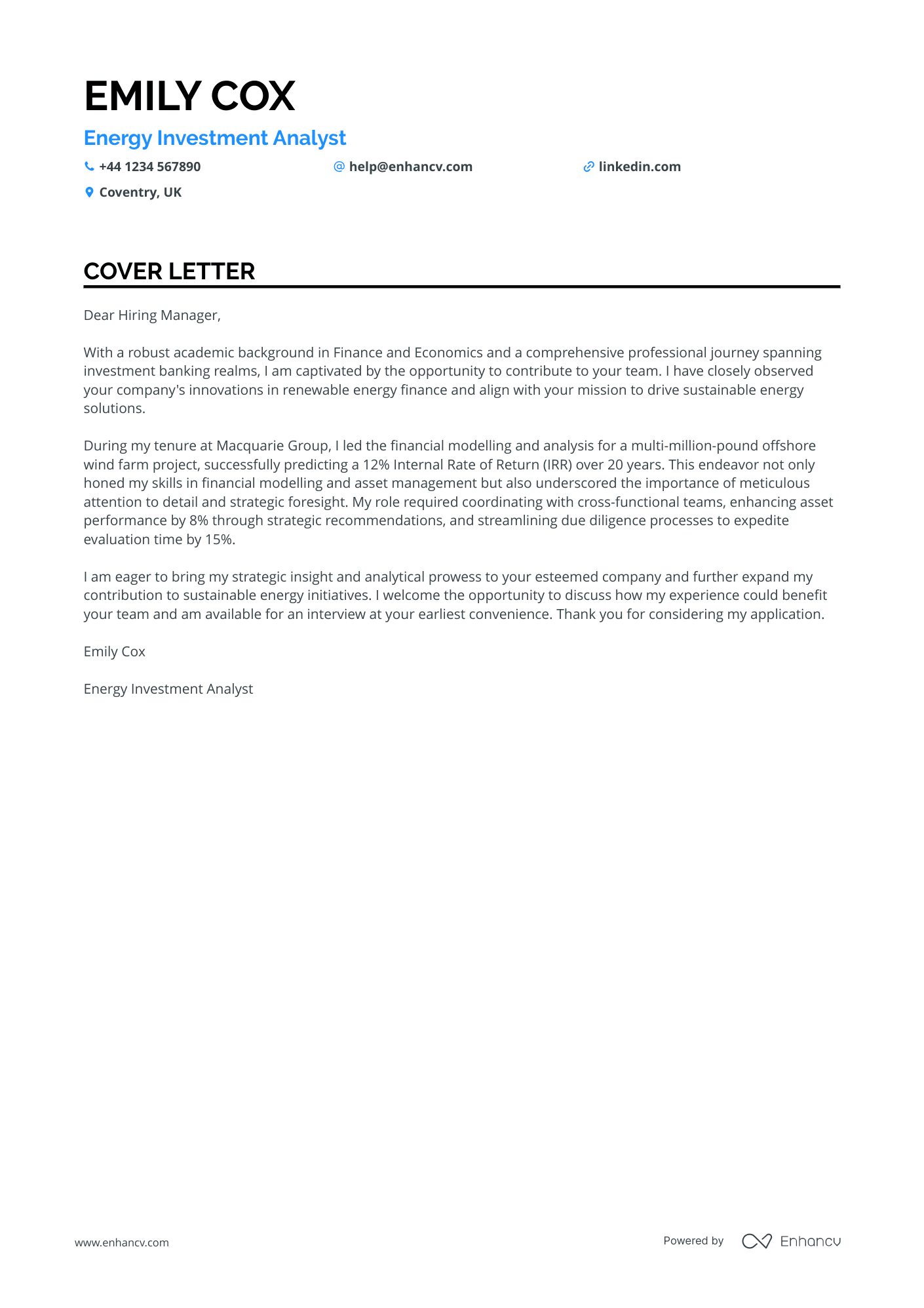Writing a strong cover letter requires close attention to detail, from the tone of voice to avoiding those pesky spelling or grammar mistakes.
Overlooking similar small details can weaken your application.
Many candidates also struggle with how to address the letter, often opting for 'Dear Sir or Madam' when they can’t find the correct contact. This can make your cover letter feel impersonal.
In this guide, we’ll show you how to perfect these crucial elements, ensuring your cover letter is polished and professional without relying on clichés.
Cover letter examples for investment banking
By Experience
Investment Banking Associate
- Relevant Experience: The cover letter effectively highlights the candidate's extensive experience in investment banking, emphasising roles and achievements that directly relate to capital markets, M&A execution, and financial modelling, which are crucial for the position.
- Quantifiable Achievements: Utilising specific figures and percentages, such as leading a £300 million M&A deal and attaining a 20% increase in client portfolio returns, underscores the candidate's tangible impact and success, which can resonate well with potential employers in quantitative fields like finance.
- Professional Certifications and Education: Mentioning advanced corporate finance courses and a Financial Risk Management certification not only highlights continued professional development but also aligns with the specialised skills required in high-level investment banking roles.
- Soft Skills and Leadership: The inclusion of team leadership and mentoring experiences, along with successful collaboration with cross-functional teams, illustrates the candidate's capability in building and managing effective teams, a key aspect for an associate-level role responsible for overseeing others.
Investment Banking Vice President
- Detailed demonstration of transactional experience: Highlighting a successful track record with multi-million pound M&A deals showcases practical expertise in investment banking, a crucial aspect for such high-level roles.
- Emphasis on sector-specific skills: Stressing technology sector expertise and market research capabilities aligns well with the specialised nature of the listed role, enhancing relevance and demonstrating depth in industry knowledge.
- Highlighting advanced certifications: Featuring relevant certifications like CM&AA and courses in financial modelling shows a commitment to professional development and expertise, which is valuable in specialised finance roles.
- Articulating leadership and innovation: Mentioning the development of new financial modelling techniques and leadership in successful deals shows the ability to drive innovation and lead teams effectively, both desirable qualities for leadership positions.
Investment Banking Director
- Certifications & Education: Highlighting advanced certifications like the CISI PCIAM Certification and a strong educational background in finance sets a strong foundation for credibility in the investment management field.
- Quantifiable Achievements: Demonstrating measurable success, such as the 20% annual asset growth and 30% increase in client satisfaction, provides concrete evidence of capabilities and past performance.
- Client Relationship Management: Emphasising a high client retention rate and excellence in client service shows an ability to maintain and grow critical business relationships, a key element in investment management.
- Leadership and Innovation: Mentioning leadership in growing assets and strategic innovations signify a forward-thinking approach and capacity to lead teams toward achieving business goals, which are vital in high-level investment roles.
By Role
Investment Banking Manager
- Highlight Relevant Experience: Emily effectively showcases her extensive experience in social investment, specifically her role as a Social Investment Strategist at Big Society Capital where she led the development of a £10m fund, emphasizing her expertise in increasing economic opportunities.
- Specific Achievements: The cover letter successfully points out key achievements, such as a 35% increase in funded entrepreneurs and a 95% funding allocation success rate, demonstrating her ability to deliver tangible results in the field of social investment.
- Relevant Skills and Education: The inclusion of skills like investment strategy, financial analysis, and stakeholder engagement, paired with a robust education background including an MBA from the University of Warwick, underscores her qualifications and suitability for the role.
- Emphasis on Communication and Community Involvement: Emily stresses her passion for community engagement and social equity, as well as her proficiency in communication skills, which are crucial for roles that involve collaboration with diverse stakeholders and representation of investment initiatives.
Investment Banking Consultant
- Emphasise specific certifications relevant to the role, such as the Certified Financial Planner and Investment Management Certification, to demonstrate specialised knowledge and credibility.
- Highlight key achievements, such as the Top Financial Consultant Award and the Excellence in Advisory honour, to showcase success and a proven track record in delivering significant financial improvements for clients.
- Underscore experience in market trend analysis and navigating market volatilities, essential skills for developing informed investment strategies and ensuring steady client portfolio growth.
- Include examples of leadership and mentorship, such as leading a team to surpass growth targets and mentoring junior consultants, to demonstrate ability to manage teams and contribute to organisational success.
Investment Banking Strategist
- Quantifiable Achievements: The cover letter effectively quantifies achievements such as a 20% return improvement, £150 million revenue growth, and a 15% increase in annual performance, providing concrete examples of the candidate's impact.
- Use of Certifications: Highlighting the "Certified Investment Management Analyst (CIMA)" certification underscores specialised expertise in advanced portfolio management, which is essential for a senior investment strategist role.
- Industry Engagement: Mentioning presentations at 10+ industry conferences demonstrates the candidate's active engagement and thought leadership in the investment community, enhancing their credibility.
- Skill in Technology: Emphasising proficiency in Python and data analytics showcases the candidate's ability to leverage technology for improved investment strategies, a valuable skill in modern asset management.
Investment Banking Risk Manager
- Highlighting robust experience in risk management across multiple organisations, showcasing a proven track record in reducing operational and compliance risks which is vital for a Risk Manager role.
- Emphasising significant achievements such as the reduction of operational risks by 35% and enhancement in risk mitigation effectiveness, demonstrating the ability to deliver tangible results and impact the bottom line.
- Mentioning relevant certifications like the Certified Risk Management Professional and Advanced Compliance Certification which add credibility and demonstrate a committed pursuit of continuous professional development in key areas.
- Demonstrating leadership and team-building capabilities through coordinated projects and cross-functional team collaborations, both paramount in fostering an environment of compliance and risk awareness within an organisation.
Investment Banking Compliance Officer
- Highlighting specialised certifications like the "Advanced Regulatory Compliance Training" and "Financial Markets Compliance Certification" enhances credibility and shows a strong foundation in compliance practices, particularly for roles requiring expert knowledge.
- Emphasising key skills such as "Regulatory Compliance" and "Risk Assessment" aligns the candidate’s strengths with the essential requirements of a Compliance Officer role, showcasing their ability to navigate complex regulatory environments effectively.
- Detailing specific achievements like reducing compliance review times by 30% or coordinating an audit process with zero critical findings underlines the candidate’s impact and ability to drive operational improvements.
- Mentioning the ability to collaborate with regulators and manage teams demonstrates leadership and communication skills, which are crucial for navigating stakeholder interactions and driving compliance culture within organisations.
Investment Banking Operations Analyst
- Highlighting the achievement of leading a small-scale project at NatWest Group that streamlined transaction processing, resulting in a notable 15% reduction in processing times, which is a key indicator of effectiveness and efficiency in operations roles.
- Emphasising the accomplishment of resolving complex customer inquiries with a 95% first-call resolution rate at Barclays UK, improving customer satisfaction scores by 12% which demonstrates strong problem-solving and customer service skills.
- Detailing the Project Management Professional Certification, which showcases the ability to manage projects effectively and is a highly regarded qualification in operations and management roles.
- Mentioning the ability to execute complex financial transactions with 99% accuracy, ensuring compliance and improving customer satisfaction, which is crucial for an Operations Specialist role.
Investment Banking Project Manager
- Highlighting Relevant Experience: The cover letter effectively showcases over a decade of experience in financial services, focusing on roles that align with the responsibilities of a Project Manager in investment projects and change management.
- Emphasising Certifications: The mention of certifications such as Certified ScrumMaster and Prince2 Practitioner underscores proficiency in Agile methodologies and structured project management, which are crucial for the role.
- Showcasing Achievements: Specific achievements, such as a 15% increase in client retention and a 120% achievement of growth targets, provide quantitative evidence of success and capability in delivering impactful results.
- Detailing Skill Sets: The letter lists key skills like Change Management, Financial Control, and Stakeholder Management, demonstrating the applicant’s comprehensive skill set relevant to the position.
Investment Banking Relationship Manager
- Highlighting Achievements: The cover letter effectively highlights specific achievements such as increasing cross-sell revenue by 25% at HSBC, which demonstrates the candidate's ability to enhance revenue through strategic initiatives.
- Emphasising Leadership and Mentorship: The candidate underscores leadership qualities by mentioning their experience in leading teams and mentoring analysts, which is crucial in a Relationship Manager role.
- Showcasing Expertise in Financial Analysis and Market Trends: Calling attention to the candidate's expertise in financial analysis and their ability to offer insights during strategic planning sessions adds value, given the strategic importance of these skills in corporate banking.
- Technical Skills and Continuous Learning: The inclusion of courses such as 'Financial Markets and Investment' and certifications in 'Advanced Corporate Finance' shows a commitment to continuous learning and skill enhancement, vital for staying ahead in the competitive field of corporate banking.
Investment Banking Product Control Specialist
- Tailored Experience: The cover letter effectively highlights relevant experience in senior finance roles, emphasising achievements such as managing a team and enhancing project outcomes, which are critical for a Financial Controller role.
- Quantifiable Achievements: By detailing specific metrics such as a 15% increase in profitability and a 20% reduction in reporting errors, the candidate demonstrates proven success and impact, which is impressive to potential employers.
- Specialised Skills: The inclusion of key skills like risk management, regulatory compliance, US GAAP, and IFRS in the skills section aligns with industry requirements and underscores the candidate’s qualifications and expertise.
- Relevant Education and Certifications: The candidate's education and relevant certifications, such as the Risk Management Certification, are mentioned, which support their capability for the role and add value to their application.
Investment Banking Financial Controller
- Highlighting relevant certifications such as "IFRS Reporting Standards Advanced Certification" demonstrates specialised expertise in accounting principles critical for a Financial Controller role.
- The ability to achieve significant process improvements, such as a 25% enhancement in financial process efficiency, showcases a strong track record of operational effectiveness and result-oriented skills.
- Emphasising leadership experience in finance, exemplified by leading a finance team to reduce the budget by 15%, conveys the capability to manage and optimise financial resources effectively.
- Mentioning achievements in successful integrations, like the seamless integration of financial data post-merger, underscores adaptability and proficiency in managing significant organisational changes.
Investment Banking Research Analyst
- Highlight Achievements: The cover letter effectively highlights quantifiable achievements, such as a 15% improvement in investment recommendations, which showcases the candidate’s impact on previous roles and relevance for a similar position.
- Relevant Skills and Certifications: The mention of specialised courses like "Advanced Equity Research" and certifications like "Certified Financial Modeling & Valuation Analyst" align well with a Research Analyst’s core responsibilities, reinforcing the candidate’s expertise.
- Data Analysis & Reporting Efficiency: Emphasising skills such as improving report generation efficiency by 20% and introducing new models shows the candidate's adeptness in analytical tasks, crucial for decision-making in financial roles.
- Passion Alignment: The candidate’s expressed passion for stock market analysis and data visualisation supports their career choice, demonstrating long-term dedication and enthusiasm for the role.
Investment Banking Sales Trader
- Emphasising Market Share Growth: Oliver's cover letter highlights a 30% increase in client portfolio contributing to a 15% rise in market share within 18 months, effectively showcasing his direct impact on business growth.
- Illustrating Compliance Success: By demonstrating a 95% success rate in compliance achievements through strategic trade solutions, the cover letter effectively communicates Oliver's expertise in navigating the regulatory aspects of the renewable energy sector.
- Showcasing Networking Acumen: The letter discusses Oliver's success in boosting brand presence by 40% through active engagement at industry conferences, highlighting his ability to enhance stakeholder relations and visibility in the market.
- Specialised Knowledge: Oliver's cover letter notes his proactive enhancement of product and industry knowledge, particularly by monitoring legislative and geopolitical changes, which is crucial for maintaining an edge in the renewable energy market.
Investment Banking Mergers and Acquisitions Advisor
- Emphasising leadership in capital markets and strategic advisories, which is crucial for banking roles involving significant decision-making and client interactions.
- Highlighting a successful track record in managing high-profile and complex financial transactions, such as capital raises and M&A activities, adds credibility and showcases expertise.
- Mentioning industry recognition, such as being awarded 'Top Financial Strategist' by the Financial Times, enhances professional reputation and distinguishes the candidate as a thought leader in the field.
- Demonstrating a strong commitment to mentorship and team leadership, which is valuable for developing internal talent and ensuring project delivery efficiency within financial institutions.
Investment Banking Equity Capital Markets Specialist
- Emphasising achievements in Equity Capital Markets (ECM) transactions helps demonstrate tangible impact and expertise within the specialised field of investment banking.
- Highlighting experience with notable financial institutions, such as Barclays and Morgan Stanley, establishes credibility and showcases a history of working with prestigious companies.
- Showcasing leadership and mentorship experience indicates capability in team management and contribution to a collaborative work environment, valuable skills for senior-level roles.
- Listing relevant certifications and courses, such as the "Capital Markets Professional Certificate" from MITx, underscores continuous professional development and specialised knowledge in the financial industry.
Investment Banking Debt Capital Markets Specialist
- Emphasising quantitative skills and financial modelling expertise is crucial for a role in Debt Capital Markets, where data-driven decision-making is central.
- Highlighting experience with bond issuance processes, especially under challenging market conditions, reinforces the candidate's capability to handle complex financial operations.
- Showcasing proficiency in stakeholder collaboration and client management underlines the ability to build and maintain strong professional relationships, critical for servicing international clients.
- Mentioning advanced certifications and tailored courses, such as the Advanced Financial Modelling Certification or International Capital Markets Course, signals a commitment to continuous professional development and market expertise.
Investment Banking Derivatives Trader
- Industry-Specific Experience: Emphasise extensive experience in the fixed income and derivatives markets, showcasing roles at top financial institutions like BlackRock, HSBC, and J.P. Morgan to underscore a deep industry understanding.
- Quantifiable Achievements: Highlight the individual's impact by providing specific figures, such as increases in trade execution efficiency, portfolio revenues, and FX turnover, to demonstrate successful performance.
- Technical and Analytical Skills: Focus on proficiency in trading strategy development, risk management, and the use of advanced technological tools, illustrating the ability to innovate and optimise trading operations.
- Relevant Certifications and Education: Mention specialised courses and certifications like the CFA Level III and advanced derivatives training from LSE to reinforce expertise and commitment to continuous learning.
Investment Banking cover letter example
Emily Cox
Coventry, UK
+44 1234 567890
help@enhancv.com
- Highlighting relevant experience: The cover letter effectively showcases the candidate's experience in the renewable energy sector, particularly through their role in managing a significant offshore wind farm project.
- Emphasizing quantifiable achievements: The letter includes specific metrics such as predicting a 12% IRR over 20 years and enhancing asset performance by 8%, which demonstrates the candidate's ability to deliver concrete results.
- Alignment with company mission: The candidate clearly connects their professional goals with the company’s mission to drive sustainable energy solutions, showcasing enthusiasm and strategic alignment.
- Professional communication and availability: The candidate communicates professionally and expresses willingness to discuss their application further, reinforcing closing statements with gratitude and openness.
Importance of cover letters in the United Kingdom
Cover letters are a crucial tool in making your application personal and engaging.
Here are three reasons why they matter:
- Personalisation: Unlike a CV, a cover letter allows you to show your enthusiasm for the role, giving a more personal insight.
- Addresses details about your career: Whether you’re changing careers or have gaps in employment, your cover letter offers a space to explain these in a constructive way.
- Meeting the job requirements: Your cover letter should be unique and tailored, clearly showing how your skills align with the role requirements.
What UK employers expect from a cover letter
When writing your cover letter for a UK employer, it’s important to keep several things in mind. First, you need to conduct a thorough research, which includes reading up on the company’s website, recent news, and their presence on social media. Understanding the company’s latest achievements and its overall mission will allow you to tailor your letter to their specific needs.
Next, focus on the company’s core values. Whether they value teamwork, innovation, or community involvement, highlighting how your own experience aligns with these principles is essential.
Finally, don’t forget to match your skills to the job’s requirements. Study the job description carefully and pick out the most important qualifications or competencies. Then, provide evidence of how you meet those criteria with concrete examples from your past work experience.
How to format a investment banking cover letter
To get your cover letter's formatting right:
- Use a modern font like Lato, Raleway, or Chivo, rather than the overused Arial or Times New Roman.
- Set your cover letter to be single-spaced with 1-inch (2.5 cm) margins on all sides—our templates are automatically set up for you.
- Ensure both your CV and cover letter are consistent in font style and formatting.
- Always send your cover letter as a PDF to prevent alterations and preserve its layout.
When it comes to structuring your cover letter, follow this sequence: begin with your address and contact details, then the employer's details (i.e. name and address), and the date. Next, start with a personalised greeting, followed by your introductory, body, and closing paragraphs. Be sure to include a sign-off and your signature at the end.
Remember, although Applicant Tracking Systems (ATS) software, which may scan your CV for keywords, won't read your cover letter, it will be reviewed by recruiters.
How to write your investment banking cover letter salutation
It's never advisable to begin your cover letter with 'Dear Sir/Madam', as it sounds comes across as impersonal.
Take the time to find out who is hiring for the role and address them directly in your cover letter greeting (e.g., 'Dear Mrs Chanceworth', 'Dear Harrod').
If you're uncertain where to find the hiring manager’s name, check the company website, look on LinkedIn, or send a courteous email requesting this information. Don't hesitate to ring reception either—they are unlikely to refuse to assist.
How to write your investment banking cover letter intro
A great option to begin your cover letter is by showing recruiters you've done your homework or research.
If the company has won an award or made headlines, congratulate them in your opening sentence, or express how impressed you are.
Provide this achievement as a reason why you admire the company, ensuring your tone remains genuine, sincere, and authentic.
How to write your investment banking cover letter body
Your cover letter body is the most spacious and vital part of this document—it highlights your true value and the impact you can bring as a candidate.
Remember, your cover letter serves a different purpose to your CV. Here, you need to show your skills in context by telling the story of one significant achievement, hinting at how you’ll help your future employer achieve their goals.
So, when writing your cover letter body:
- Use concrete achievements to demonstrate your personality and impact.
- Support your achievements with quantifiable data and metrics.
- Tell the story of a successful project you’ve worked on and explain how you contributed to the outcome.
- Highlight both hard and soft skills to make your story more engaging.
- Focus on skills that are most relevant to the role and align with the company’s needs.
How to write a closing paragraph
You’ve written a brilliant cover letter so far—so don’t undermine it at the very end.
If you think signing off with a polite 'Kind regards' or 'I look forward to hearing from you' will make a strong impression, think again.
A better approach is to make a tangible promise—one that reflects both personal and professional growth—and demonstrates your value to the recruiters.
Alternatively, encourage the hiring managers by asking when you might expect to hear back from them.
Conclusion
A standout cover letter is crucial for making an strong impression in your job search in the UK market. Personalise your letter by addressing it to the hiring manager and aligning your skills with the job description.
Use concrete examples to highlight your greatest achievement and convey your enthusiasm for the position. Finally, ensure that both your cover letter and CV are presented professionally for a consistent application.
